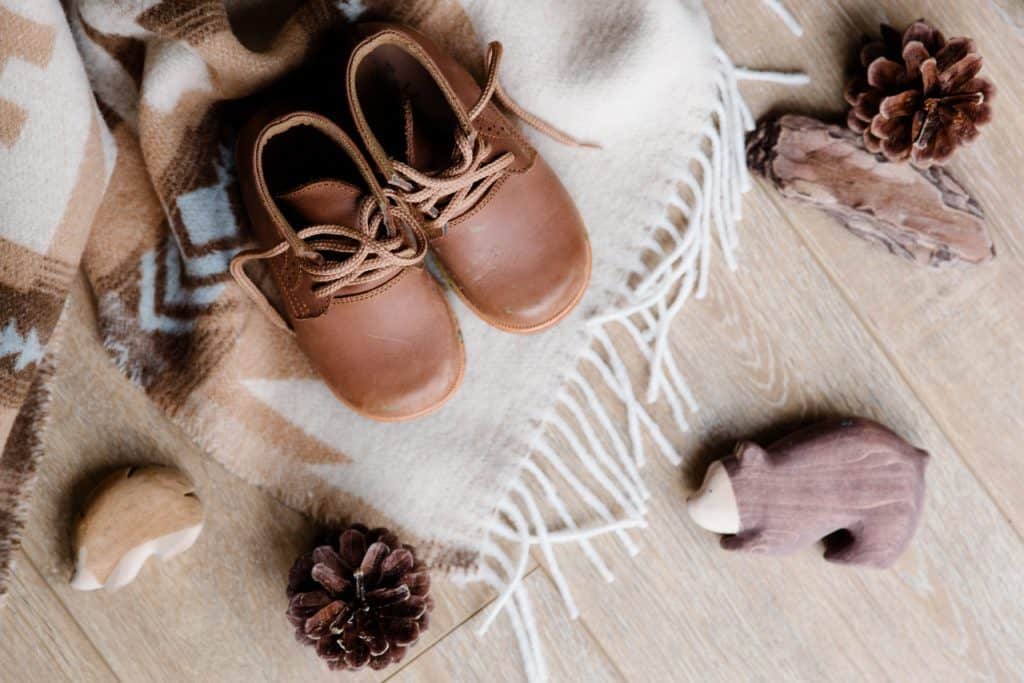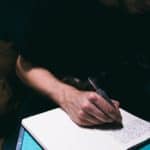Sunday Night Shoe Shine
– Nonfiction by Nancy Hambrose –

As a child, any time I got to spend with Dad amounted to the thumb space at the toe of a tight shoe.
Dad was a general handyman in the surrounding neighborhoods often leaving early in the morning and returning home by dinner time, physically drained from a hard day’s work. A relentless laborer, Dad often said he was a jack of all trades and a master of none. His dilapidated truck would grumble and bumble up the driveway every evening. Moments later, usually through the basement door, my exhausted father would appear, covered in sawdust or sheetrock debris. Dirty and tired, he had about enough energy left to eat a full meal, share in some small dinner table talk, shower, change into pajamas, and then pass out in his lounge chair, with the news or another T.V. program humming low, lulling him to sleep.
When I was little, I didn’t participate in sports or need consistent homework help, but I liked to write. I even went so far as to create a pseudo writing studio for myself in the corner of Dad’s basement workshop. I made use of the materials around me: a trash-picked bow back chair, a small rugged table that tottered when I leaned on it, and a quirky lamp, all of which Dad found and claimed as his own as he cleaned out houses after people moved or passed away – yet another handyman trade he practiced. I even used Dad’s work bench and military footlocker, places to set up loose-leaf and pencils, a dictionary and some grammar books — a place to think in quiet. Each time I visited my workspace within his own, I never found my items moved, so I guess Dad never minded my writing tools in his work space; or, maybe Dad did secretly mind and simply never told me. In hindsight, I suppose I chose this spot in the house because I was looking to spend more moments close to my father. In honest reflection, any rare time spent with Dad always felt crowded to me. In a family of four, closely-spaced children, I wasn’t the oldest, the youngest, or the neediest, and if I wanted to ask or tell Dad something, there was usually an audience. So, any time – even 10 minutes spent alone with him –was like saving new black patent leather shoes: the special pair you keep for the holidays because you so want to avoid the first scuff or crease.
In my childhood, around 7:30 each Sunday night, the most coveted time for me was the rare alone time with Dad on the basement stairs as he shined my shoes. He took great pride in making sure his children’s shoes were gleaming for the week, his dignity as a father on display as we walked. After my bath and pajama routine, I would eagerly await my turn to spend 10 minutes with Dad. Leather Mary Janes in hand, I would approach the basement door. A waft of sweet, orange-scented Castle’s hand grime soap greeted me as I turned the doorknob and descended the basement stairwell. I perched myself on the top step of the landing and handed him my shoes. Once I was seated, Dad would slip the shoes on my feet. From toe to heel, Dad’s calloused hands and careful eyes would meticulously inspect my shoes like a surgeon intensely studying his patient. He’d wink at me and smile, asking what I was going to read to him tonight, for it seemed I was always working on a poem or a short story. While I revealed a notebook or scribblings on a piece of paper, he’d pull out his wooden shoeshine kit from underneath the basement stairs. The box came complete with all the worn accoutrement: multiple horsehair brushes with palm prints from years of use, shoe shine cloths, tins of various KIWI shoe polish, lanolin, travel-sized Johnson’s Baby powder, some Q-tips and cotton balls for buffing, Vaseline for buckle shining. And so, our brief Sunday evening encounters would begin. I would read to him my latest piece, trying to keep cadence with the swoosh of the brush strokes or the zip of the buffing cloth, and my father would listen. As my first editor, Dad would offer honest, raw critiques about my writing: he’d point out a likable word or character, highlight a part he didn’t like or understand, reference a sentence he would want me to read or write again.
Yet, our time together on the basement stairs didn’t always follow this routine. Sometimes I came to him without a story to read -a blank page, ready instead to hear one of his stories about his childhood on Van Hook Street in Camden, the summers he spent as a boy working on a farm in Vineland, the way he courted my mother, or the story behind his latest trash-pick find. He told these stories in first-person, complete with adopted character voices, facial expressions, and vivid details like I have never known in any storybook. Sometimes, he’d help me practice my times tables – a heavy chore for a poor math student like me. He’d help me memorize a prayer for school, tell me a joke, teach me how to whistle, reveal a way to deal with an annoying sibling, pushy classmate, or overbearing teacher, correct me for one of my many shortcomings, and later, listen to a hopeful student council speech or offer simple advice about how to handle a pre-teen boy’s growing interest.
On snow days off from school, Dad would line my black buckled snow boots with plastic bread bags, a make-shift insulator to keep my feet dry from the slush and snow. By the time I trudged home, saucer sled flopping behind me, my boot buckles would be frozen solid. There I’d sit on the basement landing, layered in clothes, utterly frozen, and beyond tired from a winter’s afternoon of play, struggling to unbuckle my boots. It was my Dad’s strong and rugged hands that would easily loosen the iced straps. I could then slide my cold but miraculously dry feet from the boots. As a child, I remember being amazed at the dual use of bread bags and dazzled by my father’s innovation. My Dad was not a well-educated man but a well-seasoned student and A+ graduate of a ‘street smarts’ education. His pragmatic ingenuity outweighed any limited schooling. His tough hands were in no way the outward sign of his huge, gentle heart and soul.
In middle school, I graduated to saddle shoes for cheerleading and was introduced to a new tool for his craft: the little blue box and glass bottle of Esquire’s Lanol White polish. Sometimes, Dad let me hold the cap and bottle until he was ready to dip the tiny sponge. A few times he even let me invert the bottle onto the swab. Afterwards, from my poor attempts at this, I had a little white ring of Lanol White polish on my index finger. Later that night, I would lay quietly in bed, fighting sleep, picking away at the dried white polish on my fingertip, thinking about the silly story, funny joke, sincere writing critique, or bit of wisdom he selflessly gave me that evening.
By the time high school came and I was wearing heels, the shoe shine Sunday evening dates with Dad gave way to papers to type, novels to read, a part time job to handle, and friends to talk with on the phone. I felt like I had betrayed him. As I whizzed by him, busy with my growing schedule, Dad would say, “Let me see your shoes.” Like a soldier in a military line up, I’d stop at the commander’s voice, straighten my legs, and put my heels together. He would give the shoes a once-over and say, “Leave those shoes on the basement landing.” By the next morning, there were my shoes lined up with other family members’ shoes, all shiny and new, ready for the week.
Many years later, when my daughter Miriam and I returned to New Jersey, my Dad gave me a treasure I cherish to this day. Among a few new sweaters, a perfume bottle, and new book to read that first Christmas home, there were practical gifts from my father under the tree: a small ladies’ tool box complete with a handheld drill, a portable car battery charger with the directive: “You have my first grandchild in the car; you can’t ever be stranded,” and my very own shoe shine kit – complete with Kiwi polishes, dabs, swabs, and buffing cloths. Tucked inside my shine box, something else was wrapped in brown parchment paper. I opened the wrapped gift. Into my lap fell one of my father’s own shoe shine brushes he used on my shoes when I was a child. I ran my fingers over the well-worn hand prints in the wood of the brush. I was speechless for a few moments, words caught in my throat, my eyes welling with tears. When I found my voice, I thanked him profusely. He winked. I believe he understood the depth of my gratitude.
The battery charger was used religiously on cold winter days when my first single-mother clunker wouldn’t start in parking lots. The handheld drill gave me a renewed sense of independence as a single woman beginning again. I learned to drill holes, hang pictures of Miriam as she advanced through her school years, and attach the legs to a picnic table for the yard. And the shoe shine kit graces my home still. Inside my shoeshine box is Dad’s beloved horsehair brush and sweet memories of times spent with him on the basement landing each Sunday night. These moments were timeless lessons wrapped in his salt-of-the-earth wisdom as he buffed my shoes, cared for my feet, smoothed out my writing, and polished my life: Like shoe laces, tie things up and don’t let them linger or run loose. Turn on your heels and walk away from anyone who mistreats you. Stomp out hatred where you see it. Walk in faith and in love. Stand for what is right. Polish up your act. Brush yourself off and start all over again.
About the Author – Nancy Hambrose

Nancy Hambrose is a celebrated thirty-year veteran in education, teaching literature, writing, and ESL to students – kindergarten through college. Finally emerging from the closet as a personal essay writer, Nancy’s honest voice, coupled with resiliency, is her gift. Her work has been published on motherwellmag.com and in the literary journal metaforemagazine.com. An avid birdwatcher, backyard astronomer, and plant enthusiast, Nancy lives in joy with her husband Christopher in Haddon Heights, New Jersey.
Did you like this story by Nancy Hambrose? Then you might also like:
Pieces of You
Desert Spirits
Bread Knife
Gelato and Frost
For David
Recovery
One Cut at a Time
Like reading print publications? Consider subscribing to the Dreamers Magazine!

Dreamers Writing Prompt Generator
Experience the power of simplicity with our unique writing prompt generator. Designed for writers who crave spontaneity and surprise, our tool delivers one meticulously crafted prompt at a time.

Top 25 Most Popular Manga Right Now
If you’re searching for the most popular Manga right now, this top 25 list is the ideal starting point, whether a beginner or enthusiast.